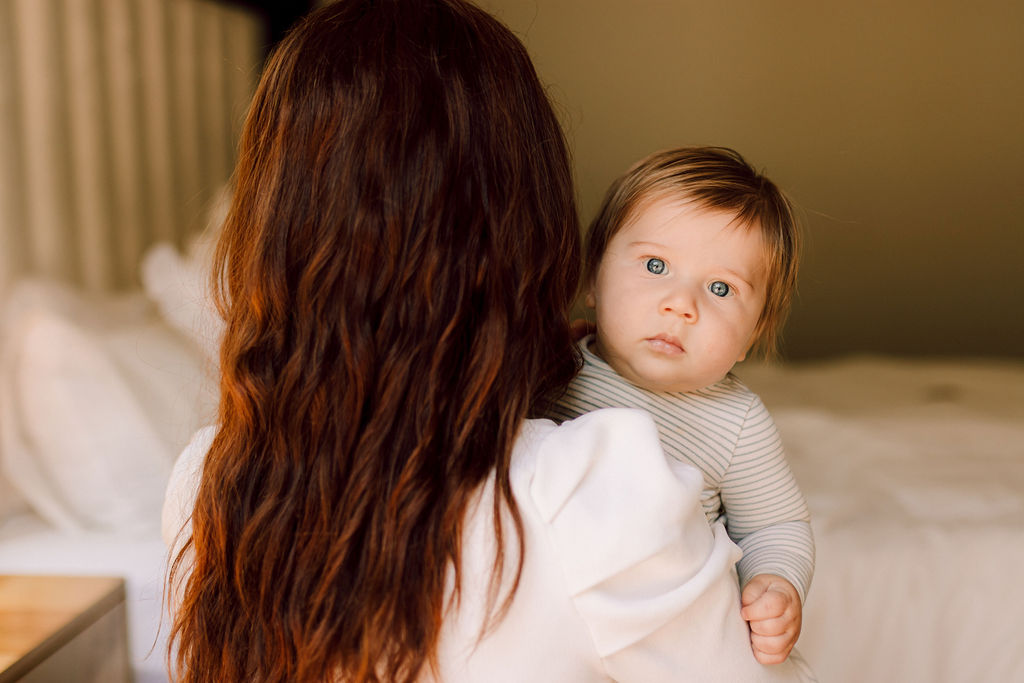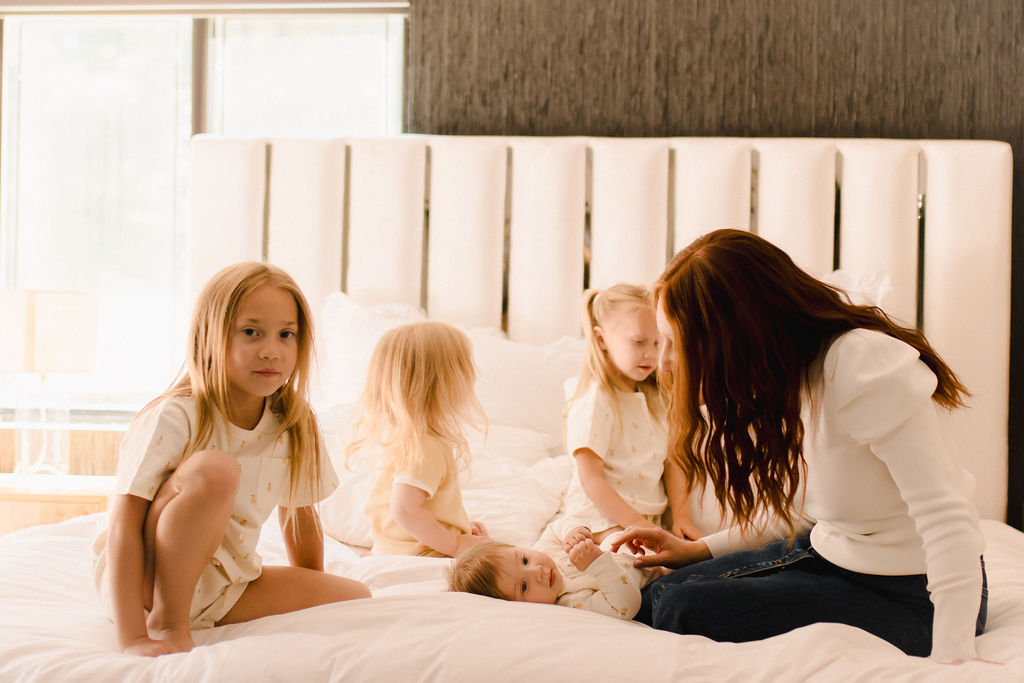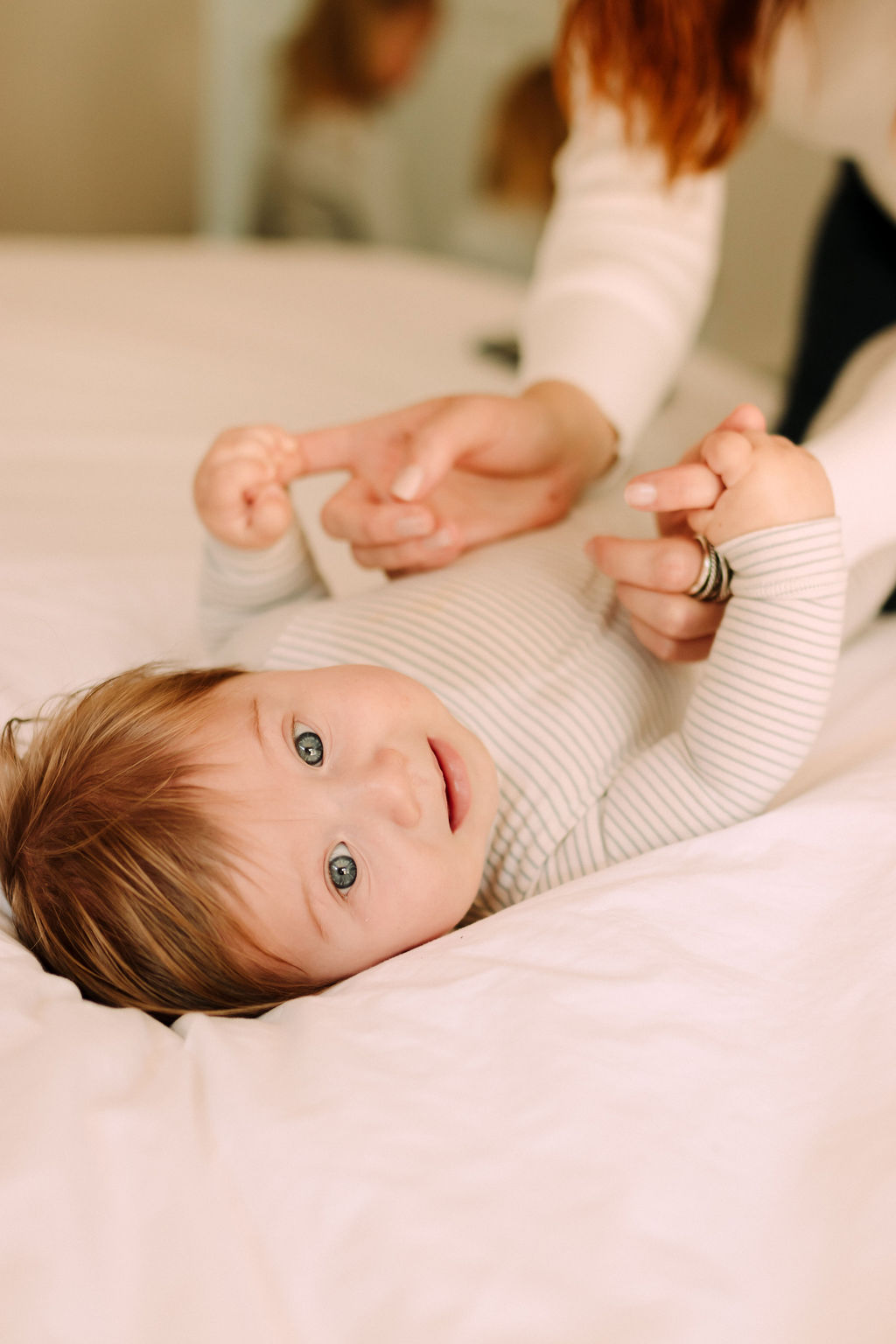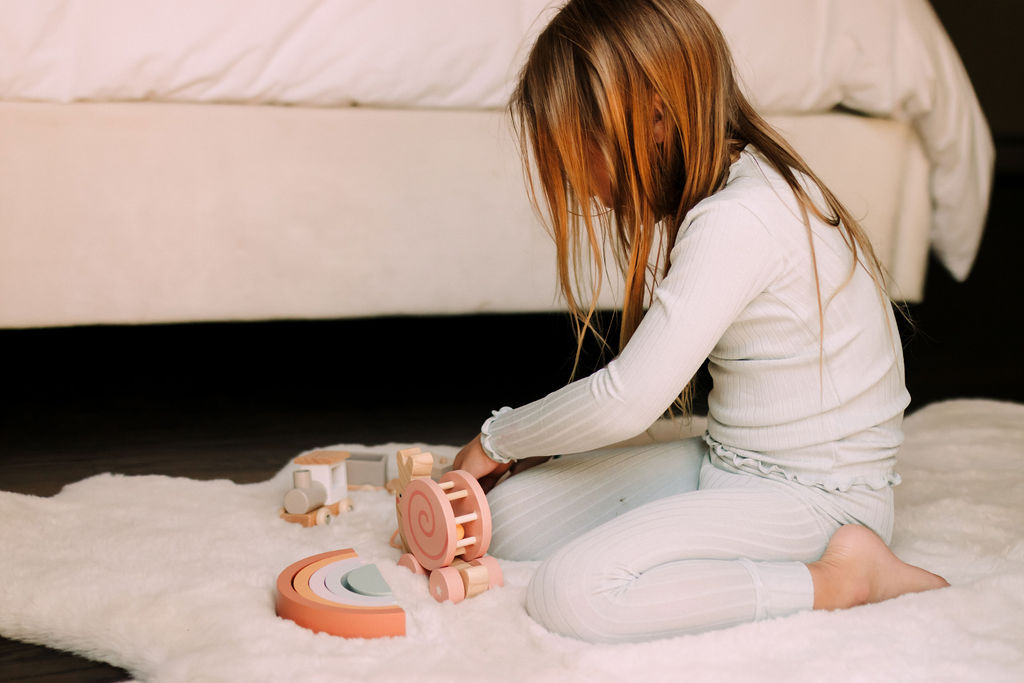- Why is Crying So Triggering?
- The Holy Space of Held Crying
- An Emotional Mirror: Why Your Baby’s Crying Feels So Intense
- Unresolved Wounds: Revisiting Your Own Childhood
- How Your Inner Baby Affects Your Reactions
- Why Crying Opens the Door to Old Wounds
- The Spiral of Guilt
- The Parenting/Reparenting Journey
- Crying as a Teacher
- Self Compassion: How We Heal
Why is Crying So Triggering?
Life is just so circular.
Things repeat again and again until you heal them.
I think of this often when we talk about mothers and babies and crying.
How crying is so triggering for us mamas to hear.
How crying is seen as absolutely evil and how babies must never be allowed to cry.
My hot take?
Modern western culture is thoroughly uncomfortable with parenting babies.
Period.
First, we start off in the 80’s with with Cry It Out methods. Let your baby cry themselves to sleep but don’t be in the room because it’s too hard to hear.
Then the pendulum swings waaaaaaay the other way, where sleep training is the modern devil and if your baby cries, it’s your fault for not immediately responding and stopping those tears. Oh, and by the way: because of you, they’ll have a damaged brain and insecure attachment. Ouch!
The Holy Space of Held Crying
Neither of these approaches allow for something really important in the parenting relationship: holding your baby’s feelings. Holding their sadness, their discomfort, their fear, their grief.
Sitting with it. With them.
Holding it, holding them.
That’s because we don’t do feelings in America.
We do shopping.
And therapy.
Where we blame our parents for leaving us to Cry It Out as babies.
But maybe….
Just mayyyybe….
The answer doesn’t lie in a particular methodology of sleep.
Maybe it’s not about sleep training, or bedsharing, or anything in between.
Maybe it’s about living in flow with your baby’s emotional experience.
The cries of our babies tug at the heartstrings of our inner child.
And when we start to pay attention to that, everything changes.
The entire parenting experience becomes a deeply personal psychospiritual dance of attunement, between us and our baby, our past and our present, of healing old wounds and moving more fully into the present.
Here’s some food for thought next time your baby cries:
An Emotional Mirror: Why Your Baby’s Crying Feels So Intense
When your baby cries, it’s not just a “feed me” or “hold me” alert – it can often feel like an arrow shot straight into your heart. An arrow that pierces through decades of time, shaking loose old feelings and emotions you thought were packed away for good.
Our babies’ tears have an incredibly powerful way of prying off the lid on our own childhood experiences, bringing up past memories in your body, even though you’ve tucked them away (for years and years) in a box labeled DO NOT OPEN. Sometimes, your baby’s cry stirs up echoes of little you—the times you didn’t feel seen, heard, or comforted. Your inner child whispers, “Hey, don’t forget about me.”
What you can do: Recognize that your baby’s cries aren’t just about their needs. They’re also a chance to take a peek at what’s going on underneath the surface in your system – and maybe start unpacking it.
Unresolved Wounds: Revisiting Your Own Childhood
The incredible thing about babies is that they never hold back. They never think “I don’t want to bother anyone so I won’t cry now even though my diaper needs to be changed,” or “Gee, I’m hungry but my mom looks overwhelmed so I won’t burden her with my problem now. I’ll just figure it out on my own.”
Babies have needs and they don’t hesitate to express them. And when they do cry, it’s raw and unfiltered. If you grew up in a “keep it together” or a “stop being such a baby” or “stop crying already” kind of family, then your baby’s cries can bring up a LOT of old feelings. All the times you were told to “stop being dramatic” or “crying doesn’t help” come pouring forth when you hear your baby cry. And then we wonder why it’s so hard to hear our babies cry.
What you can do: Instead of pushing your feelings back down and numbing yourself through mindless scrolling, emotional eating or impulse buying something online, try this: take a deep breath and let yourself feel whatever it is you’re feeling. Give your emotions some airtime. We’re often afraid to feel our feelings, but that’s how they pass through us: when we allow them to fill us up and be fully felt. Once they’re seen, they can pass through us.
How Your Inner Baby Affects Your Reactions
When your baby cries, your brain doesn’t calmly list off an organized checklist of what could be bothering them. Instead, a siren goes off in your nervous system, especially if your childhood had its fair share of emotional chaos. Your brain might confuse their cry with your own long-ago moments of helplessness. The amygdala (your brain’s fight-or-flight center) has one job: to keep you safe. And it doesn’t always get the memo that you’re no longer that scared little kid. Whenever you’re triggered, that’s a sign that the past and the present are blurring together in a state of fear, anger, sadness, shame, guilt or embarrassment.
What you can do: Take a pause. Take a long, slow breath. Remind yourself: “This is now, not then.” Acknowledge your feelings: “This feels hard, because it is hard.” Ground yourself: “This is my baby. I’m the grown-up here. We’re safe.”
Why Crying Opens the Door to Old Wounds
Have you ever noticed that sometimes, your baby’s crying can feel so much bigger than the moment? Like, they’re upset, but you’re the one spiraling? That’s because those cries have a sneaky way of unearthing old memories—times when you needed comfort and didn’t get it.
These moments aren’t just hard—they’re revealing. Think of them as little signposts pointing to the parts of you that need healing. That need holding. That need loving. Parenting really is a journey of reparenting ourselves.
What you can do: After the tears have stopped, ask yourself: “What did I need back then that I can give myself now? Let yourself cry it out if you need to. Crying can be incredibly healing.
The Spiral of Guilt
“Am I doing enough?” “Why did I react that way?” “Why is this so hard?” “Why can’t I be better at this?” “I’m a terrible mom!” We all hear these voices in our head – the inner critic. And the truth is that our inner critic (we all have one!) developed well before we became parents. Often the way we were spoken to as a child becomes our inner voice. Guilt isn’t a sign you’re failing. Look at it like your inner child waving a flag and asking for a some love and understanding.
What you can do: Treat yourself like you’d treat your best friend. Repeat after me: “You’re doing great. It’s hard, but you’re showing up—and that’s what counts. You’re not giving up. And that’s what matters most.”
The Parenting/Reparenting Journey
Parenting has an incredible beauty and a unique opportunity: Every time you comfort your baby, you’re also comforting a part of yourself. When you say, “I’m here. You’re safe,” you’re not just telling that to your baby. You’re telling it to your younger self, who has unmet needs and is waiting for your love. We truly can heal ourselves, in the most powerful ripple effect: soothing your baby soothes your soul. And when you heal, you show up for your baby with even more love and empathy. In a gorgeous circle of love.
What you can do: Imagine holding two babies—the one in your arms and the one in your heart. Both need love, and you’re the one who can give it. Say it out loud: “Mommy’s here. You’re safe now. You’re safe with me.”
Crying as a Teacher
A crying baby isn’t just a challenge to be met. It’s an opportunity for huge personal growth. Soothing a crying baby teaches you how to regulate your emotions, find patience you didn’t know you had, forgive yourself when you lose it, and reframe what crying means to you. Tell me where else in life you can grow so much, so often, in such a subtle-yet-powerful way.
Looking at it this way turns everything we know about crying on it’s head. Tears aren’t a problem to be solved. They’re a road to be traveled, together with your baby, your inner baby and your current mama self.
What you can do: After the chaos calms, ask yourself: “What did I learn from this? What did I learn about my baby? What did I learn about myself?” Embrace the process. Crying isn’t the enemy—it’s part of the story. I know, easier said than done. But powerful mothers can hold the cries of their children without losing themselves in the process.
Self Compassion: How We Heal
When your baby won’t stop crying, self-compassion is everything. Imagine holding your baby in one arm and your younger self in the other. That’s where healing happens—not in being perfect, but in showing up, with love and acceptance. Also, being kind to yourself makes it easier to be kind to your baby. And that kindness creates a safe, loving space for both of you to grow.
What you can do: Pause when you start feeling overwhelmed. Take a long, slow, deep breath. Remind yourself: “I’m doing my best, and that’s enough.” Keep showing up, even when it’s messy. That’s where your power lies.
By leaning into the emotions that get stirred up when your baby cries, you’re not just getting through parenthood—you’re rewriting your own story and rewiring your own brain. Transforming the state of your existence in this world. Transforming your baby’s life and the lives of your future grandchildren, who will be soothed by the baby you’re soothing today.
And that, my friend, is the magic of being a mom.
Psst… Have you seen my free mini course about why Cry It Out won’t work for your baby? It will teach you three reasons I recommend avoiding Cry It Out or Ferber methods, and what you can do instead to help nurture your baby towards better sleep! Grab the free course here.








Comments +